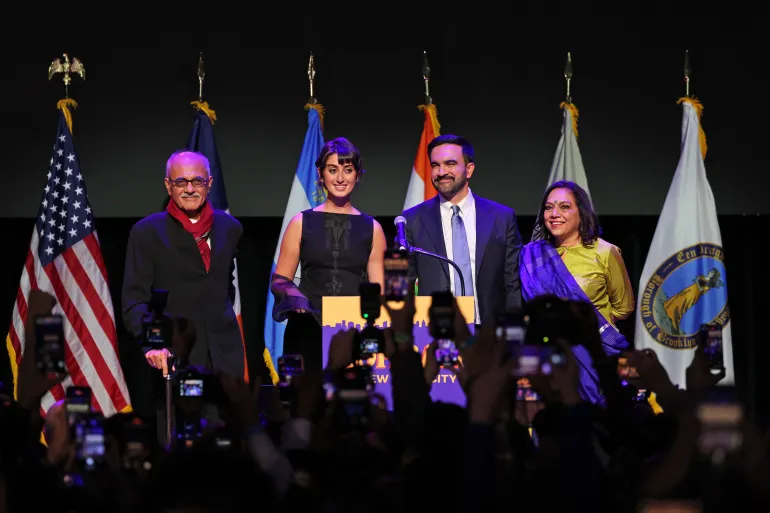
“I am one of you and I am here for you,” said New York’s mayor-elect Zahran Mamdani in fluent Arabic as he addressed his supporters on Tuesday, in his first speech after being elected to the position, thus becoming the first Muslim to take over the administration of the largest American city economically and in terms of population.
In the same speech, Mamdani (34 years old) dedicated that historic victory, always in the Arabic language, to “Mama and Papa” and to the one he called “my life,” meaning his Syrian-American wife, artist Rama Sawaf Dawaji (28 years old), whom he married at the beginning of this year
As soon as Mamdani finished his impassioned speech, he was joined on the stage by the woman he described as his “wonderful wife,” his academic father Mahmoud Mamdani, and his world-renowned film mother Mira Nair. They all stood before the press cameras in a tableau marking the beginning of a “new era” in the history of New York, which, as he put it, “was built by immigrants and now it is time for immigrants to take over its affairs.”
The painting and the celebratory atmosphere surrounding Mamdani’s victory in the mayoral election reflect the spirit of multiculturalism, ethnicity, religion, and language in which he grew up, a historical characteristic of the giant city, home to nearly 8 million people and considered one of the centers of the global financial system.
Prior to yesterday’s speech, Mamdani appeared on more than one occasion speaking in Arabic and sometimes in Spanish during his election campaign, in a telling embodiment of the multiplicity of cultural influences from which he drew, starting from his childhood in Uganda and South Africa before he arrived in New York at the age of seven.
At the height of the mayoral campaign, Mamdani appeared in a video speaking in Arabic: “Hello.. My name is Zahran Mamdani and I am running to be the new mayor of New York City. I know what you are thinking. I look like your in-law from Damascus. But my Arabic needs a little work.”
Mamdani adds, “However, today I would like to ask for your support on November 4th. Living in New York has become expensive for everyone… and it has become difficult to live here and raise children. As mayor, I will freeze rents for more than two million people, make buses fast and free, and guarantee comprehensive childcare for all families… I am one of you and for you
In addition to being the “son-in-law of the Levant,” as alluded to in that passage, Mamdani’s relationship with the Arabic language extends further and deeper than that, and its roots go back to the family environment that breathed thought, culture, and politics under the wing of a father who is considered one of the pioneers of African and post-colonial studies at Columbia University, and a mother with a global cinematic achievement in acting and directing.
In that atmosphere, the house’s guests were giants of the academic community and pioneers of anti-colonialism, such as his father’s university colleagues, the late Palestinian thinker Edward Said, and the Palestinian historian Rashid Khalidi, which also contributed to the development of Mamdani’s political awareness and what was embodied in his early involvement in defending the Palestinian cause.
Academically, Mamdani followed in his father’s footsteps and in 2014 received a Bachelor of Arts degree in African Studies from Bowdoin College (Maine), where he co-founded a branch of the “Students for Justice in Palestine” organization
“The bearded man” in Cairo
In that rich intellectual atmosphere, Mamdani began to learn Arabic, and to deepen his knowledge of it, at the age of 22, he traveled to Cairo in June 2013, on an educational trip that lasted 6 weeks and coincided with the atmosphere of the overthrow of the late President Mohamed Morsi, which made it more than a station for learning, but an opportunity to stand on a critical period in the country’s modern history.
Mamdani documented that experience at the time in an opinion piece entitled “The Bearded Man in Cairo,” referring to the suspicions and doubts his beard caused him among those he dealt with at the school, his place of residence, and in Tahrir Square, where some considered him a “Brotherhood member,” before he was forced to cut that beard.
One of the most telling moments of that experience was when Mamdani, at the urging of his Egyptian teacher and for linguistic reasons, listened to President Morsi’s last speech before his ouster. He didn’t understand it, so he asked his Egyptian roommate for a translator, but the roommate surprised him by saying he, too, hadn’t understood the speech. Mamdani commented on this by saying that his roommate had been suspicious of him because of his beard and suspected him of belonging to the Muslim Brotherhood
Rap Experience
Before fully immersing himself in political work, Mamdani had an experience in singing that suggests his mother’s influence on his cultural formation, in which he blended rap and hip-hop styles, and chose the nicknames “Young Cardamom” and “Mr. Cardamom” in his musical performances.
Rapper Mamdani drew inspiration for his artwork from his African and Indian roots, incorporating social commentary from his life in New York. He appeared in the soundtrack for the film “Queen of Katwe,” directed by his mother Mira Nair in 2016.
On more than one occasion, Mamdani proved during the election campaign that he was still loyal to his artistic past, and that singing and acting ran in his veins, as he appeared on several occasions singing or acting in an improvisational manner, reflecting his cheerful spirit and sense of humor.
It seems that art and political commitment were the chemistry that brought him together with the Syrian artist Rama Sawaf Dawaji, whose drawings and designs express a great interest in the humanitarian crises in Gaza, Sudan, Lebanon, and other Middle Eastern issues
